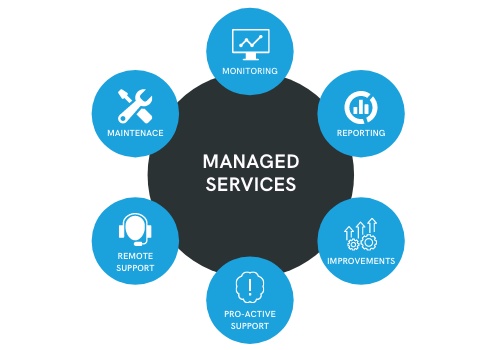In the dynamic landscape of modern business, organizations are increasingly turning to Cloud Managed Services to streamline their operations and propel growth. This article explores the multifaceted benefits that cloud management services offer, revolutionizing the way businesses handle their IT infrastructure.
1. Enhanced Scalability: Cloud Managed Services empower organizations to scale their resources up or down based on fluctuating demands. This agility ensures optimal performance and cost efficiency, allowing businesses to adapt to changing needs seamlessly.
2. Improved Cost Efficiency: By outsourcing the management of their cloud infrastructure, organizations can significantly reduce the costs associated with maintaining in-house IT teams and physical servers. Cloud services operate on a pay-as-you-go model, enabling businesses to pay only for the resources they consume.
3. Robust Security Measures: Top-tier cloud service providers implement rigorous security protocols, offering organizations a level of data protection that may surpass what they can achieve independently. This includes data encryption, regular security updates, and advanced threat detection mechanisms.
4. Business Continuity and Disaster Recovery: Cloud Managed Services provide robust backup and disaster recovery solutions, ensuring that organizations can swiftly recover data in the event of unforeseen disruptions. This enhances business continuity and minimizes downtime, crucial for maintaining operations and customer trust.
5. Focus on Core Competencies: With the burden of infrastructure management lifted, organizations can redirect their internal resources and expertise toward core business functions. This strategic shift allows for greater innovation and responsiveness to market trends.
6. Continuous Updates and Maintenance: Cloud service providers take charge of infrastructure maintenance and updates, ensuring that organizations benefit from the latest technological advancements without the hassle of managing these processes internally. This guarantees a consistently high level of performance and security.
7. Seamless Collaboration and Accessibility: Cloud Managed Services facilitate improved collaboration among teams, regardless of their geographical locations. Employees can access necessary data and applications in real-time, fostering productivity and efficiency in a globally connected work environment.
8. Flexible and Customized Solutions: Cloud management services offer flexibility in choosing the services that best suit an organization's specific needs. This customization ensures that businesses pay for and utilize only the resources essential to their operations.
9. Environmental Sustainability: Cloud infrastructure promotes eco-friendly practices by optimizing resource utilization and reducing the carbon footprint associated with maintaining on-premises data centers. This aligns with the growing emphasis on corporate social responsibility and sustainability.
10. Rapid Deployment of Applications: Cloud services enable swift deployment of applications, allowing organizations to adapt to market trends and roll out new services quickly. This agility is invaluable in the fast-paced, competitive landscape of today's business world.
In conclusion, embracing Cloud Managed Services empowers organizations to revolutionize their IT infrastructure, fostering efficiency, scalability, and innovation. The comprehensive benefits outlined above underscore the transformative impact that cloud management can have on organizational success in the digital era.


No comments yet